Leth finished reading Shadow Sister by Lily Meade
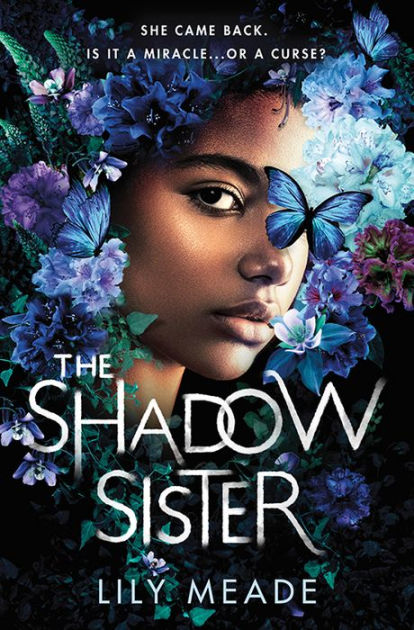
Shadow Sister by Lily Meade
Sutton going missing is the worst thing to happen to Casey, to their family. She’s trying to help find her …
Plagiarism is Love! I'm an anarchist and a lawyer.
I've found reading for pleasure more difficult lately, but I enjoy non-fiction social critique, science fiction, 18th century fiction. Bonus points if it's public domain.
This link opens in a pop-up window

Sutton going missing is the worst thing to happen to Casey, to their family. She’s trying to help find her …
I knew Lily Meade when we were kids, so this book has been on my list for a long time. I was happy to see the audiobook on Libby. It's very much her writing what she knows, and it gets properly emotional precisely when it needs to.
Although we're not close, I decline to give a full review primarily because mine would be the only one here. I'm super duper not the target audience for this YA novel about sibling conflict and systemic oppression, so the fact that I didn't outright love it should mean very little to someone who is. If it sounds like you are, give it a shot.
If I get around to Lily's follow up, a novel about the Hex Girls from Scooby Doo... You already know that I'm the target audience for that, lol.
I knew Lily Meade when we were kids, so this book has been on my list for a long time. I was happy to see the audiobook on Libby. It's very much her writing what she knows, and it gets properly emotional precisely when it needs to.
Although we're not close, I decline to give a full review primarily because mine would be the only one here. I'm super duper not the target audience for this YA novel about sibling conflict and systemic oppression, so the fact that I didn't outright love it should mean very little to someone who is. If it sounds like you are, give it a shot.
If I get around to Lily's follow up, a novel about the Hex Girls from Scooby Doo... You already know that I'm the target audience for that, lol.
I knew Lily Meade when we were kids, so this book has been on my list for a long time. I was happy to see the audiobook on Libby.
As a reader, it's not really my genre, but I do appreciate it and her. It's very much her writing what she knows, and it gets properly emotional precisely when it needs to.
I knew Lily Meade when we were kids, so this book has been on my list for a long time. I was happy to see the audiobook on Libby.
As a reader, it's not really my genre, but I do appreciate it and her. It's very much her writing what she knows, and it gets properly emotional precisely when it needs to.
Genuinely disappointing in the way that only a favorite childhood author could be. The themes of the racial and cultural superiority of Europeans over other peoples made my stomach churn. The revelation that Mijak's God was inherently evil and misleading the people of Mijak whereas the God of the rest of the world was righteous even as it came in many forms was incoherent. Hekat, Vortka, and Dimitrak were simply flanderized to single character traits and wasted through the second and third books. Virtually no characters had any arc to speak of in this last part. The idea that they needed the help of a European who had never even been to Mijak to tell that people about how to worship God properly even as he spent the last two books literally calling them barbaric. Just disgusting.
Also, just a fundamental worldbuilding sin: after the first book, she started …
Genuinely disappointing in the way that only a favorite childhood author could be. The themes of the racial and cultural superiority of Europeans over other peoples made my stomach churn. The revelation that Mijak's God was inherently evil and misleading the people of Mijak whereas the God of the rest of the world was righteous even as it came in many forms was incoherent. Hekat, Vortka, and Dimitrak were simply flanderized to single character traits and wasted through the second and third books. Virtually no characters had any arc to speak of in this last part. The idea that they needed the help of a European who had never even been to Mijak to tell that people about how to worship God properly even as he spent the last two books literally calling them barbaric. Just disgusting.
Also, just a fundamental worldbuilding sin: after the first book, she started referring to Mijak's God by a different name when Zandakar was speaking to people with a different native language. But the Ethreans are basically described as speaking English, so we never learn a different word for Ethrea's God, let alone the gods of the other nations. Once again, Mijak is separated not just as an antagonist but as a conceptual inferior. Bah.
"Empress" on its own was an OK thought experiment and tragedy, although the Point of it is kind of up in the air. After that, the story of the second and third books was a plodding political drama that only got more offensive as it continued and centered faux-Europeans.
Really hope Karen Miller comes back to finish "Tarnished Crown" in some form, because I do really like her writing generally. But I hope she knows in her bones that doing this as a trilogy was a mistake.
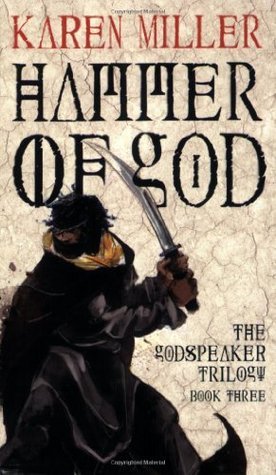
In Ethrea, Rhian sits upon a precarious throne. Defiant dukes who won't accept her rule threaten the stability of her …
The racial aspect of the story continues to grate on me. But, truly, the part I enjoy least is the anime-style strategy discussions. At this point, it's fair to say that I'm just tired of this story overall, but I do intend to finish it. I've owned an omnibus copy of the trilogy for years. I remember buying it from Barnes & Noble with my mother and being very excited. I got about 100 pages into "Empress" and got distracted for at least a decade. Pity, pity, pity that it should have gone this direction. But I suppose the silver lining is that I can pass that big book on to someone else now. Maybe they'll enjoy it more than I would, I guess.
The racial aspect of the story continues to grate on me. But, truly, the part I enjoy least is the anime-style strategy discussions. At this point, it's fair to say that I'm just tired of this story overall, but I do intend to finish it. I've owned an omnibus copy of the trilogy for years. I remember buying it from Barnes & Noble with my mother and being very excited. I got about 100 pages into "Empress" and got distracted for at least a decade. Pity, pity, pity that it should have gone this direction. But I suppose the silver lining is that I can pass that big book on to someone else now. Maybe they'll enjoy it more than I would, I guess.
There were twinges of racial insensitivity towards the end of the second book, and the fact that the entire first book was an exercise in some exoticism somewhat smoothed that over a little bit. It's not a series that is, overall, about the supremacy of European civilization, y'know. It's also not a story that is fundamentally about race, or at least it isn't any more so than another story written by a white person that includes racial differences and discrimination. Anything the European country says about its superiority is at least mirrored by Hekat as an Empress in some ways.
And yet. The series cannot escape the fact that the perspective switch away from Mijak is both racialized and making Mijak inferior, at least morally. Plus, the debates over alliances and distrust of an obviously Asiatic stand-in people. A story where the feux-Europeans are the protagonists defending against invaders …
There were twinges of racial insensitivity towards the end of the second book, and the fact that the entire first book was an exercise in some exoticism somewhat smoothed that over a little bit. It's not a series that is, overall, about the supremacy of European civilization, y'know. It's also not a story that is fundamentally about race, or at least it isn't any more so than another story written by a white person that includes racial differences and discrimination. Anything the European country says about its superiority is at least mirrored by Hekat as an Empress in some ways.
And yet. The series cannot escape the fact that the perspective switch away from Mijak is both racialized and making Mijak inferior, at least morally. Plus, the debates over alliances and distrust of an obviously Asiatic stand-in people. A story where the feux-Europeans are the protagonists defending against invaders should be more careful than this.
Just one comment here or there where there really shouldn't have been. One too many reframings of Mijaki culture as not "civilized". The revelation, from Ethrea's god, that Mijak's god is inherently evil. The references to Zandakar as "black" that seemed to suddenly begin.
Treating the first book as worldbuilding that would mostly be unneeded for the second and third was a choice. It does not seem to me like it was the best choice, to be quite honest.
I am struck yet again by how inscrutable the overarching themes of this story have been to me. Could they have been difficult to see simply because I was not in the headspace to read "Empress" as intended to be sickening and wrong as opposed to merely different? Big disappointment, if so, because Mijak was by far the most interesting set of ideas here. The rest is just dukes and duchies and Europe. Blah.

In Ethrea, Rhian sits upon a precarious throne. Defiant dukes who won't accept her rule threaten the stability of her …
It reminds me of the truism that worldbuilding will never seem as interesting to the reader as it does to the writer who's invested too much into it. By the time the story has essentially resumed in the final third, the book is nearly over. And the cliffhanger—essentially a misunderstanding to be resolved early in the next—amounts to jangling keys. There is only so far good sentences can take a book. There's got to be a better theme on the other side.
It reminds me of the truism that worldbuilding will never seem as interesting to the reader as it does to the writer who's invested too much into it. By the time the story has essentially resumed in the final third, the book is nearly over. And the cliffhanger—essentially a misunderstanding to be resolved early in the next—amounts to jangling keys. There is only so far good sentences can take a book. There's got to be a better theme on the other side.
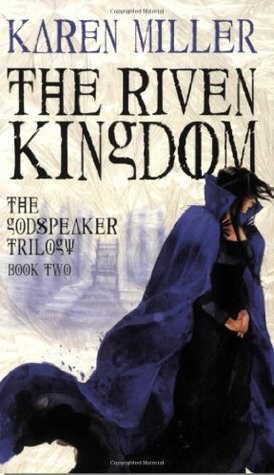
The King of Ethrea is dying. His only surviving heir is the Princess Rhian. But if her enemies have their …
A bit of a frustrating read as a second book in a trilogy. Rather than jump back into the story, it's SO MUCH about new characters that the first two thirds of it are worldbuilding for this new place that is more like a European kingdom. And so the main thing that occurs in this story—the crowning of a queen—occurs in the third third.
I feel like a broken record saying that I enjoy Karen Miller's prose. That's still true, as ever, but damn. I've been listening to this to go to bed for weeks at this point, and it feels like stuff is just starting to happen.
A bit of a frustrating read as a second book in a trilogy. Rather than jump back into the story, it's SO MUCH about new characters that the first two thirds of it are worldbuilding for this new place that is more like a European kingdom. And so the main thing that occurs in this story—the crowning of a queen—occurs in the third third.
I feel like a broken record saying that I enjoy Karen Miller's prose. That's still true, as ever, but damn. I've been listening to this to go to bed for weeks at this point, and it feels like stuff is just starting to happen.
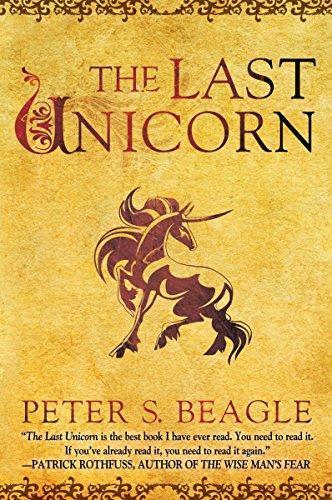
The Last Unicorn is a fantasy novel by American author Peter S. Beagle and published in 1968, by Viking Press …
So... This is completely different from "Empress". And more in Miller's fantasy kingdom wheelhouse. With this complete change comes the same sort of thematic issue "Empress" had, though: what in God's name is this story about beyond being a yarn? I'm entertained, but listening to this is like falling asleep to a slot machine, a bit. "Dexterity Jones" is a hilarious fake name, lol.
So... This is completely different from "Empress". And more in Miller's fantasy kingdom wheelhouse. With this complete change comes the same sort of thematic issue "Empress" had, though: what in God's name is this story about beyond being a yarn? I'm entertained, but listening to this is like falling asleep to a slot machine, a bit. "Dexterity Jones" is a hilarious fake name, lol.
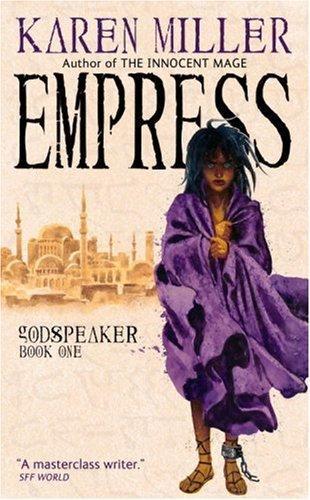
Her name is Hekat-- And she will be slave to no man.
In a family torn apart by poverty …
The ending is very intense, kind of hammering home the impression I got from reading the blurb about the sequel that it will be essentially a different story entirely, lol. Ay, the cardinal sin of "Empress" is its length, which feels interminable because of its repetitive appellations for the characters and the religious rhetorical framework they use to fight when they are not using weapons. That said, its scope is impressive. Hekat's rise over the years has all the fury and inevitability of a mythic figure drenched in blood. Her undoing is encountering a love she cannot understand just as much as it is her conflation of her ego with the God's will, I think. I'm certainly curious to learn what comes next.
The ending is very intense, kind of hammering home the impression I got from reading the blurb about the sequel that it will be essentially a different story entirely, lol. Ay, the cardinal sin of "Empress" is its length, which feels interminable because of its repetitive appellations for the characters and the religious rhetorical framework they use to fight when they are not using weapons. That said, its scope is impressive. Hekat's rise over the years has all the fury and inevitability of a mythic figure drenched in blood. Her undoing is encountering a love she cannot understand just as much as it is her conflation of her ego with the God's will, I think. I'm certainly curious to learn what comes next.